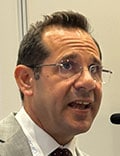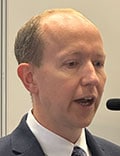Two UK Cardiology Trials Struggle to Recruit Patients
MANCHESTER — Two ongoing cardiology trials in the UK are facing substantial recruitment challenges, researchers reported at the British Cardiovascular Society (BCS) Annual Conference 2025.
The BRITISH study has enrolled fewer than one third of its targeted 2504 patients over 2 years. Meanwhile, CRAAFT-HF has recruited just 22 of its 1200-patient goal since launching in December 2024.
“We are running behind schedule,” said Andrew Flett, a consultant cardiologist at University Hospital Southampton NHS Trust and principal investigator for BRITISH. “We're running at about 50% of where we should be, and we're putting in every effort to try and improve that.”
CRAAFT-HF’s chief investigator, Pier Lambiase, professor of cardiology at University College London, said that the trial’s eligibility criteria were “evolving” and being adjusted to boost recruitment.
Entry Criteria Adjustments for CRAAFT-HF
CRAAFT-HF is comparing surgical vs medical ablation of atrial fibrillation (AF) in people with heart failure and a reduced ejection fraction (EF) of 50%.
The trial is still in its vanguard phase, with 14 centres open for an average of 4.5 months. The aim was to have at least 120-215 patients recruited across 10 sites within the first year.

Despite a large potential pool of patients with heart failure and AF seen in clinics, “only about 5% are referred for ablation,” Lambiase said.
To improve recruitment, proposed changes include:
- Broadening the definition of AF to include paroxysmal and persistent types (up to 3 years’ duration), confirmed by ECG, Holter monitoring, or cardiac implantable electronic devices (CIEDs)
- Relaxing inclusion thresholds for New York Heart Association (NYHA) class and LVEF thresholds
- Removing NT-proBNP and medication optimisation criteria for trial eligibility
“We've learned very quickly that this is threatening the trial,” Lambiase said. “It's a lot of work to get the patient recruited, start optimal therapy, repeat the [echocardiogram], make sure they're still in the trial.”
He estimated that the revised criteria could have added 62 patients — tripling current enrolment.
Lambiase remains optimistic, citing remote follow-up protocols and international collaboration plans with centres in Canada, Australia, Sweden, and Spain.
Expanding the pool of associate principal investigators to include nurses and pharmacists may also help accelerate recruitment.
The BRITISH Study
The BRITISH study, active since 2023, is running at 46 of its planned 50 UK sites and actively recruiting.
It aims to determine whether scarring detected via cardiovascular magnetic resonance is associated with reduced mortality in patients with nonischaemic cardiomyopathy and severe systolic heart failure (LVEF ≤ 35%) who receive implantable cardioverter defibrillators.

Flett reported that of the 390 patients enrolled so far:
- Half were recruited within 1 year of diagnosis.
- Just under 20% were recruited within 6 months.
- Almost two thirds had NYHA Class II heart failure.
- 38% had AF.
Flett said this is “the best-treated heart failure population in a heart failure trial that I’m aware of,” noting high rates of evidence-based therapy:
- 93% on beta-blockers
- 97% on antihypertensives
- 92% on SGLT2 inhibitors
- 88% on mineralocorticoid receptor antagonists
The median age is 66 years. Most participants are White (93%) and male (80%).
Addressing Gender Disparities in Trial Recruitment
The underrepresentation of women — just 20% of the current cohort — is “a major source of concern,” Flett told Medscape News UK.
The BCS and the British Heart Foundation Clinical Research Collaborative have previously highlighted the need to include more women in clinical trials. A consensus paper in the journal Heart, published at the start of the BCS annual conference, outlined strategies to improve female participation.
However, Flett noted that nonischaemic cardiomyopathy is more common in men. “We're going to recruit the patients that are there, and most of them are men,” he said. If we had “the luxury of plenty of patients, we could obviously hold back on male recruitment,” he added.
Efforts are also underway to increase the number of female principal investigators (PIs). Currently, just 6 of the 46 site PIs are women.
Recruitment could take another 2-3 years at the current pace. Plans are being considered to open additional sites in Australia and to remind UK centres of the importance of balanced gender recruitment.
The BRITISH and CRAAFT-HF studies are funded by the British Heart Foundation. Flett and Lambiase had no conflicts of interest to disclose.
Sara Freeman, BSc, MSc, is a freelance medical journalist based in London, UK. She has been reporting for specialist healthcare news organisations for more than 20 years.


 Admin_Adham
Admin_Adham


